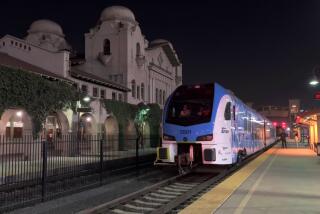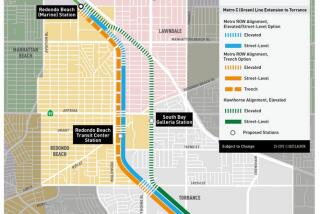‘Skunk Train’ Cutback Threat Raises Stink
IRMULCO, Calif. — It is 11:08 a.m., and Hans Burkhardt is standing where he usually can be found at this time of day: Waiting for the morning Skunk.
Right on time, the cheerful yellow “Skunk Train,” an aging, self-propelled passenger coach, lumbers out of the forest between the whistle-stop ghost towns of Irmulco and Shake City.
As the Skunk pulls up to the Burkhardt family stop, conductor Bob Reid leans out the vehicle’s door, deftly snatches Burkhardt’s canvas mailbag off a wooden post and just as smoothly deposits the family’s incoming deliveries.
It is a graceful, nostalgic ballet that Burkhardt has watched for a decade--and one that Reid has performed for more than a quarter of a century. It is all part of life along the Skunk Line, a curious little anachronism deep in California’s redwood forest.
The Skunk--so named by curmudgeonly steam-engine crews when the California Western Railroad, as the line is formally known, bought its first diesel-fired engine in 1925--links the towns of Fort Bragg and Willits, as it has since the line was completed in 1911.
More important, the scenic railroad links the 48 or so people who live along the line with the rest of Mendocino County.
For some, it is their only connection to the outside world.
Now that connection--and its history and tradition--is threatened.
Financial problems have forced the Skunk Line’s current operator, Mendocino Coast Railway, to seek government approval to reduce operations during the winter, when the number of tourists is down and local ridership is too low to cover expenses.
The proposal has raised a considerable stink among Skunk Train aficionados, particularly those who rely on it for mail service, grocery and hardware deliveries--and as a way out when flood or fire cuts off the few rutted, rocky dirt roads in the area.
Indeed, many folks in the area consider the Skunk a trusted old friend, one that has safely delivered their ailing parents to the hospital and their young children to school. It is common for people living along the line to stop what they are doing and smile and wave as the Skunk chugs by.
“When you buy property and make your life here, you depend on that train,” said Gary Ballard of Northspur, who owns and operates a small sawmill for his fellow backwoods homesteaders. “It brings our mail, and it keeps us in touch with the outside world.”
It also keeps rural folks in touch with each other. Over the years, Ballard and Burkhardt said, the train has helped people along the line share and barter everything from milk to plastic pipe.
“The real value of the train to us doesn’t show up in black and white on a corporate balance sheet,” said Vanna Rae Bello, who operates a Christmas tree farm with her family on land they have owned for 19 years. “This (train) was here when we bought the property. It’s part of why we live here; it’s part of the romance of being here.”
Such intangibles cannot be expected to come at the expense of the railroad, she conceded. But she concurred with others that there should be a compromise short of a complete abandonment of weekday service in the winter. Perhaps two- or three-day-a-week service could be tried, she suggested.
Often in winter, she said, heavy rains make impassable bogs out of the few dirt roads serving the area; bridges wash out and some cabins have no road at all. The logging road between her home and paved highways, for example, is 10 miles long and takes an hour to negotiate in the best of times.
“When that goes, there is no other way out” except the train, she said.
Partial service also could mean a continuation of regular mail delivery to the area. U.S. Postal Service spokeswoman Phyllis Hopkins in Fort Bragg said there are no plans for dealing with a discontinuance of service by the train, which is paid an undisclosed sum each year to deliver mail along the line. Hopkins said the Post Office would have to arrange for independent contractors to drive through the half-dozen or so dirt roads that snake through various parts of the area.
Homeowners, meanwhile, say train service was a part of the covenant between original home site buyers and the old Union Lumber Co., which built and ran the railroad in sections from 1885 to 1911 to facilitate logging. Later, the firm decided to sell individual parcels along the line. In 1969, Union Lumber Co. was acquired by Boise-Cascade Corp., which sold the railroad and adjoining timber holdings to Georgia-Pacific in 1977.
Gerald J. Allen, the railroad’s general manager, denied that railroad service was ever guaranteed to property owners.
He also said that people living along the line account for only about 5% of all passenger traffic. The rest are tourists.
‘A Real Hardship’
“It certainly would create some hardships for them,” he said of plans to cut back service, “but it also creates a real hardship for the railroad to continue to provide daily service.”
A Willits company, Little Lake Development Corp., recently offered to buy the entire railroad and preserve its year-round operation, perhaps with more frequent use of the 50-year-old Baldwin steam locomotive and elegant, vintage passenger coaches that attract large crowds in the summer. However, the first right of refusal belongs to San Francisco-based Mendocino Coast Railway.
Both firms are negotiating with Georgia-Pacific Corp., but the talks are complicated by a continuing fight between the state Public Utilities Commission and the federal Interstate Commerce Commission over which agency has jurisdiction in the case. The PUC, which opposes service reduction, says it regulates the railroad because it operates entirely within California. The ICC, which has agreed to let the railroad cut down service, asserts that a 1980 federal railroad-deregulation law gives it the supreme authority.
Prevented by state and federal regulations from simply abandoning the line, Georgia-Pacific contracted with Mendocino Coast Railway to operate it. If the Skunk ran in the black, the companies agreed to share any profit, Allen said; if the Skunk lost money, Allen said, Georgia-Pacific agreed to cover the deficits and guarantee to Mendocino Coast Railway $6,000 a month for its services.
Maintenance Nightmare
Allen said Georgia-Pacific has expressed dismay at the size of Skunk Train losses, which Mendocino Coast Railway said totaled $63,000 in January alone. This, he said, included servicing the vintage rolling stock and maintaining the track itself--a nightmare of steep grades, hand-dug tunnels, unstable soils, old bridges and heavy rain. The track runs up 3% grades, around 30-degree turns, over 31 bridges and through two tunnels. It averages 9.5 curves in each of the 40 miles along the route.
“They (Georgia-Pacific executives) don’t want a money-loser,” Allen said, “and they’ve asked us to see what we can do to reduce that loss and eliminate it. . . . I’m not talking about a total elimination of service. I’m talking about operating whenever I want; that is, whenever it is profitable.”
The losses, Allen said, accrue on winter weekdays, when as few as four or five paying passengers board the train. He said 85% of the line’s passengers ride from June to September. Only about 5% ride from December to February. The company has not detailed exactly what reduced winter services would mean.
“What we’re attempting to do is reduce service during the losing times and increase service during the profitable times,” Allen said. “We feel that we are primarily recreational in nature and thus should not operate under archaic rules and regulations, and should not have our operations dictated to us by government.”
Cannot Determine Loss
However, in petitioning for deregulation, Mendocino Coast Railway told the state Public Utilities Commission that it is “unable to determine with certainty the amount of profit or loss attributable solely to the operation of passenger service.” Freight trains also run on the Skunk Line; freight revenues have fallen by more than 80% since Mendocino Coast Railway took over operations.
Declining freight revenue, stagnant passenger loads and ballooning deficits--along with some peeling paint, crudely patched upholstery and malfunctioning toilets inside the trains--have led some local people to wonder if Mendocino Coast Railway is intentionally mismanaging the railroad.
“They do not want people to ride the train,” Burkhardt said as he fed the trout he raises as part of his family’s self-sufficient life style. “They want it to seem so unprofitable to get it deregulated or stop it altogether.” Or to drive down the price if the management company tries to buy the Skunk from Georgia-Pacific.
Local Operator Sought
Allen denied it. “I have heard that before, and I don’t buy it,” he said, pointing out that such a scheme would violate his firm’s compact with Georgia-Pacific. “While we would like to purchase this line, we aren’t operating at a loss to make that easier.”
Local residents nonetheless hope that a local operator will be allowed to take a run at operating the railroad, and with the help of their elected officials, they pledge to pursue that end.
“It would be a disaster if they were deregulated,” said Hannah Burkhardt, Hans’ wife. “That train is really a part of Mendocino’s life.”
More to Read
Sign up for Essential California
The most important California stories and recommendations in your inbox every morning.
You may occasionally receive promotional content from the Los Angeles Times.










